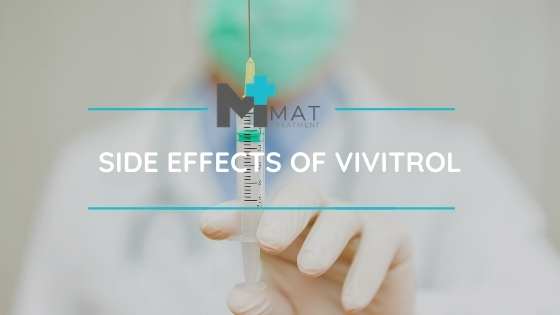Table of Contents
Did you know that between 40% and 60% of people who have been treated for drug or alcohol addiction have relapsed within the first year? Are you part of that statistic?
There’s no shame in relapse. Many people consider it part of the recovery process. You’ve taken so many steps forward that one step back isn’t something that you should be ashamed of. It does mean, though, that you may need more help in overcoming your drug or alcohol problem.
This is where medication comes in. Anti-addiction medication, like Vivitrol, may help. But what are the side effects of Vivitrol? What is it, and is it dangerous?
We want to give you a quick guide so that you can make an informed decision about whether or not Vivitrol is for you. Keep reading to learn more.
Table of Contents
First: What Is Vivitrol?
Vivitrol is the brand name of a medication called Naltrexone. It is a medication used for treating alcoholism and drug addiction for people who are otherwise resistant to treatment.
Vivitrol helps to control urges by reducing the “good” feelings that come from alcohol and other substances, restricting the dopamine flow from the brain.
Vivitrol isn’t a replacement for other forms of treatment. It’s used in conjunction with counseling and group therapy in order to make a well-rounded treatment plan that can serve the most people.
It’s only taken once per month, making it an attractive option for people who aren’t reliable with daily pills. It’s shown to be as effective as those daily options for people suffering from substance abuse.
While Vivitrol is great for its ease of use and overall safety, it does have some side effects that patients should be aware of and prepare themselves for.
What Are The Side Effects of Vivitrol?
While Vivitrol is a safe medication, it’s not without side effects. As with all medications, these side effects will vary depending on the person. Some are mild and some are more serious and we want to discuss both so you can decide if it’s the right medication for you. Always consult with your doctor before starting a new medication.
Mild to Moderate Vivitrol Side Effects
Most people who take Vivitrol will only experience side effects in the mild to moderate range. These aren’t dissimilar to the side effects of other common medications. While they’re uncomfortable, they aren’t dangerous and they aren’t a sign that the medication isn’t working.
Some of these side effects mimic flu and cold symptoms. These include things like:
- Chills
- Fever
- Runny Nose
- Congestion
- Body aches
If you find that these side effects don’t subside, or that they’re unbearable, consider asking about other medication options.
Other side effects of Vivitrol mimic food poisoning, such as:
- Cramping
- Loss of appetite
- Vomiting
- Nausea
These side effects should be temporary, but as with the previous ones, if you find them unbearable there’s nothing wrong with seeking out a second opinion or a different treatment option.
Some psychological side effects include
- Insomnia
- Restlessness
- Irritability
- Fatigue
Overall, while these side effects are unpleasant, they aren’t a cause for alarm. They’re normal and it’s possible that they will subside as you continue to take the medication. When in doubt, consult your doctor to keep your mind at ease. Many of these symptoms mimic withdrawal symptoms, but they’re safe.
Serious Vivitrol Side Effects
Not all side effects of Vivitrol are as gentle. Some side effects should be discussed with a doctor as soon as you notice them. Some may be due to allergic reactions or pre-existing conditions. If you have a pre-existing condition, or if you’ve used opioids within the past 10 days, be sure to notify your doctor before taking the Vivitrol.
The first serious side effects are psychological. One is depression. While many people suffering from addiction also suffer from depression, if your depression worsens with Vivitrol you may be at risk for self-harm.
The second is disorientation. If you find yourself getting dizzy or confused more often than normal, this is considered a serious side effect. You may also experience hallucinations. Your doctor will decide, based on the seriousness of the condition, if you need to make a change.
The other side effects are physical. If you don’t seek help right away they may have detrimental effects on your health.
If you find yourself coughing excessively after starting the Vivitrol you may be experiencing pneumonia from an underlying Vivitrol allergy. Hives or rashes are also symptoms of a Vivitrol allergy.
Vivitrol also has the potential for causing liver damage.
These side effects are more common if you’ve been continuing your opioid use. Don’t be afraid of getting “in trouble” with your doctor. Be honest if you’ve relapsed before your next shot.
Those who are taking medications that contain opioids, even if they’re prescribed, should not take Vivitrol, as well as anyone who is still going through acute opioid withdrawal.
Are There Withdrawal Symptoms?
Many Vivitrol side effects mimic the symptoms of alcohol or drug withdrawal, but there are no withdrawal symptoms from the Vivitrol itself. This means that if you find yourself experiencing severe side effects from the Vivitrol you should be able to cease the use of the medication as soon as your doctor says it’s appropriate.
Is Vivitrol Right for You?
Vivitrol is proven to be an effective anti-addiction medication. Those suffering from alcohol or drug abuse will benefit from taking Vivitrol in conjunction with their other recovery methods.
While there are side effects of Vivitrol, medication-assisted recovery is highly recommended for anyone who finds themselves treatment-resistant through conventional methods.
If you’ve found yourself struggling with your recovery and you’re ready to seek medical assistance, we want to help.
Get in touch with us via phone, live chat, or email. A California detox center can help. We want to answer your questions and help you reach sobriety.
Get Help Today
Don’t go through the process of recovery alone. There are people who can help you with the struggle you’re facing. Get in touch with one today.



